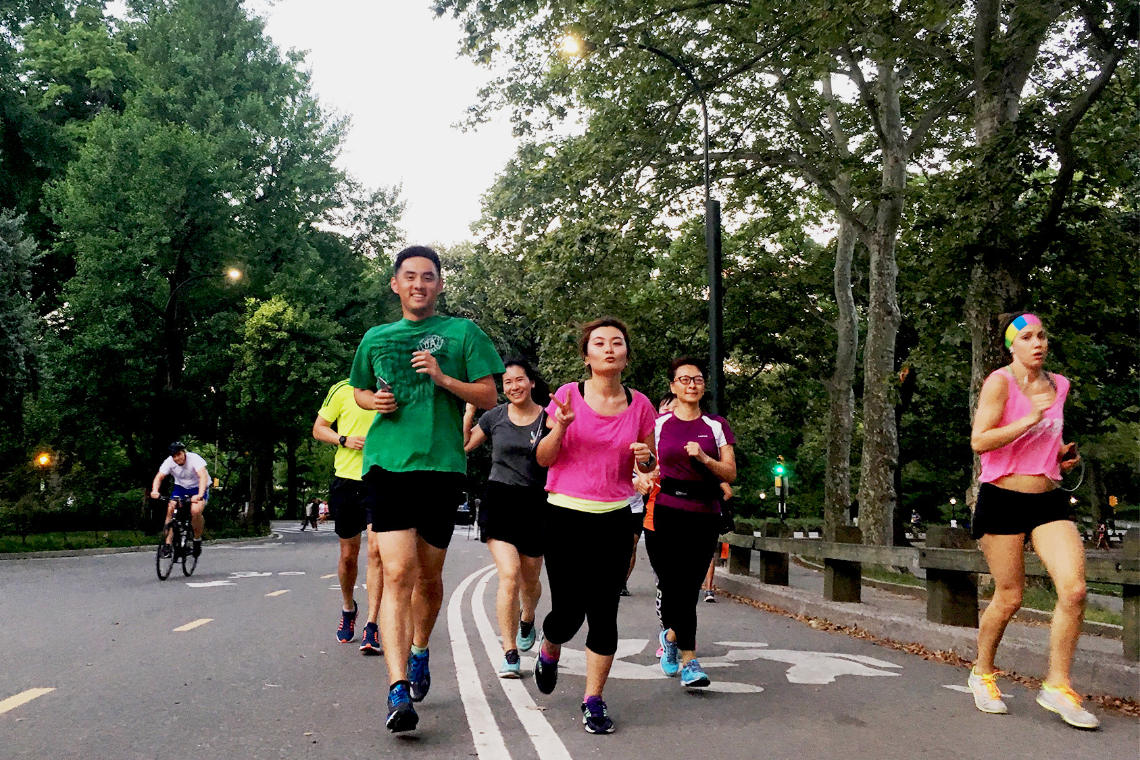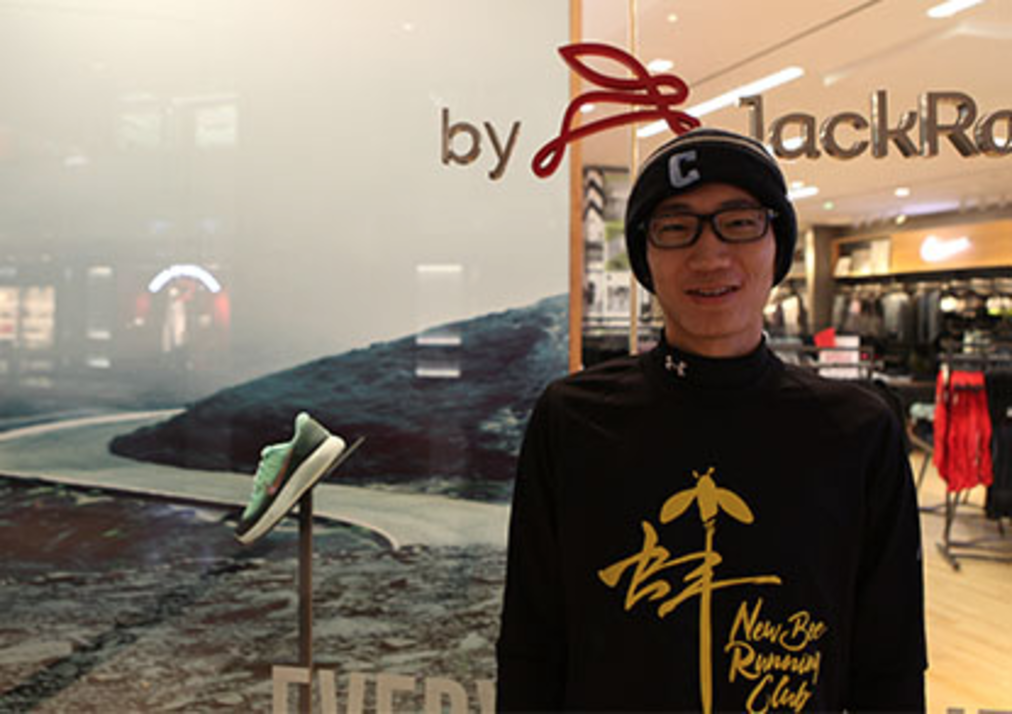Chinese immigrants and students find community through running in Central Park
The story behind a social-media-based running group for Chinese people in New York.

“The running club saved me,” says Jiao Yanan, who had been feeling depressed after she lost the lottery for a visa to work in the U.S. “When I run and see the Manhattan skyline, I forget about the confusions for my career and doubts about my love life.” She had joined a group of young Chinese who live in New York City and formed a group in early 2016 to run together, usually in Central Park.
“Running in Central Park is everyone’s dream,” says Ma Yue, who took a job in New York in 2006, but since then has only ventured out to Central Park on special occasions — such as when friends visited her from China and, most recently, for a family stroll on Chinese New Year. That changed in May 2016, when she met up with four strangers from the internet to run a six-mile route around the Jacqueline Kennedy Onassis Reservoir. All of them were young Chinese working in the city. They met on WeChat, a popular Chinese social app, which has 760 million active users. “I’ve run alone for eight years and am just happy to have a squad,” says Ma, sitting in her downtown office at the Museum of Chinese in America. In her 40s, she places herself as among the oldest in the running group, but she remains a core member for the same reasons as everyone else: to keep in shape and keep social.

The first group run had been somewhat like a Tinder date en masse, but better, because the five came to share a healthy activity and had a lot to talk about, such as the struggle to get an H-1B — the work visa that provides many Chinese with a legal status to stay and work in the country. Ma wasn’t the only lonesome runner looking to connect. In a week, the WeChat group membership grew from less than 20 to around 80, and the Wednesday Central Park run became a regular outing with about 40 people showing up to run four, six or even eight miles.
Going the distance, building a community

Yi Junxiao, the man who initiated the group — now known as the NewBee Running Club — only wanted a few running buddies in the city. In 2012, Yi came to the U.S. for a Ph.D. in information technology, though he says it mostly gave him a boring lifestyle and a thick waistline, the latter thanks to his roommate, who turned out to have a knack for Chinese cooking in an American dorm room. Before he founded the group, Yi used to get up at 4 or 5 a.m. for a solitary run to stay healthy.
“I felt like there are many Chinese running here but there wasn’t any organization for it,” says Yi, standing about 5’7″ in height and wearing glasses with a dark purple frame. He was especially concerned that the newcomers who were just beginning to pick up running would easily get injured without proper training.
Earlier in the spring, Yi searched for people posting about running in New York on the Chinese social media site Weibo, and sent a private message inviting them to a WeChat group for New York runners. “Among us are Ivy League graduates” and “young elites” working on Wall Street, Yi wrote. After finding his first members on Weibo, more and more runners joined the group. They came from all over the internet, including running apps like Strava and Gudong, social media like Facebook, and Douban, a Chinese website for book and film reviews, hobby groups and organizing group activities. Some runners migrated from other WeChat groups.
While at first he was taken aback by the group’s sudden popularity, Yi soon took to his new role, growing from a runner with a mission to the ruler of a fiefdom — an active WeChat group with about 200 members. The number fluctuates, due to new members coming in and Yi’s removal of a small number of inactive members, defined by failing to make two runs totaling four miles in a month. Yi’s house rules dictate that each new member must announce themselves with a brief self-introduction, and stickers and moving emojis, as well as “parochial nationalism” and “regional discrimination,” are prohibited.
Most members are in their twenties or thirties, and about 80 percent of them are working (mostly in IT, consulting, accounting and design) while the rest are still in school. Many came from China on an F-1 or student visa, then managed to snag an H-1B visa to stay and work in New York. For most, the group not only helps them plug into life in New York but also serves as a bond to China.
“I learned so many things after joining the group,” says Ma, the professional who moved to New York a decade ago. She is exhilarated by the new slang words and inside jokes she learns from the younger members. They call Whole Foods “Hou Fuzi” (which means “Monkey-fucious,” a pun on Confucius) and Trader Joe’s “Quede Jiu” (which means “wicked uncle”).
Fitting running into their (social media) lives
He Ruiying, another member who joined early in the summer, explained how important the WeChat feed was to the group and to her running lifestyle. Scrolling down her WeChat timeline, sprinkled with Nike Plus screenshots and photos of her in workout clothes, she finds a June post about her first NewBee run titled “Running toward sunlight,” followed by a running man emoji, a sun emoji and a heart. She had posted two photos, one of the group posing at the park entrance by Columbus Circle, and another of her in an orange racerback top, running into the light.
Media had also caused her some difficulty, however. “I told my mother I am going to run a half marathon,” He relates. “She told me I’m not allowed.” Her mother had seen news in China that included “lots of coverage” where “marathon runners died during the race.” Considering the cases “very extreme” and unusual, she replied to her mother that she had paid for the race and it was not refundable.

In the past few years, running has gained popularity in China with more and more running groups being established, smartphone apps launching and workout selfies being popularized on social media. The number of marathon races held in China has increased from 13 in 2010 to 134 in 2015, partly due to the government’s relaxation of registering sports races in order to promote a healthier lifestyle.
Yet there is a long way to go from being eager to be fit or from being part of a social fad to seriously training for a race. “In China, running is rising as a way of socializing,” says Chen Yike, a 23-year-old student at New York University who has been running for three years and ran marathons in Tokyo, Chicago, Boston and Berlin. “Social media is a double-edged sword; it gets people interested, but those who blindly follow the trend and increase their miles…can get injured easily,” she says. “After all, running is a process of repetition and only those who truly love it can carry on.”
Yi has been skeptical of social media’s role in running, even though his club would not have been possible without it. Recently, however, his cynicism has softened, as he now acknowledges, “To truly love running means I can’t despise those who run just to post on social media afterward.” He admits, “I’m slowly coming to embrace that.”
You can find the club on WeChat by searching for the NewBee Running Club or 新蜂跑团. If you’d like to join the group, add lifeloveryjxx to your WeChat contact list and ask for an invitation.





